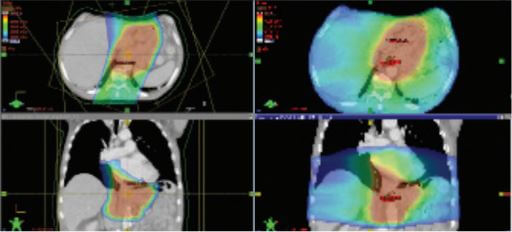Proton Therapy for Esophageal Cancer
Treating Esophageal Tumors With Proton Therapy
Esophageal tumors grow in the inner layer of the esophagus through outer layers. This presents a unique challenge, as the esophagus is located in close proximity to essential organs like the heart, lungs, spinal cord, liver, stomach and small bowel.
How Is Esophageal Cancer Treated?
Treatment for esophageal cancer is often a combination of therapies. Radiation is often prescribed in concert with chemotherapy, before or following surgery.
Traditional radiation can cause damage to these crucial organs, while proton therapy provides another option that can be less aggressive on the body. With proton therapy, a concentrated dose of radiation is applied directly to the tumor in the esophagus, limiting toxicity and harm to the vital, healthy tissue surrounding it. As a result, the risk of side effects is significantly reduced with protons.

Comparison image – Proton Therapy is on the left, Photon Therapy is on the right
The Maryland Proton Treatment Center (MPTC) Treats a Variety of Esophageal Tumors with Proton Therapy:
- Adenocarcinomas
- GE junction tumors
- Squamous cell carcinomas
Benefits of Proton Therapy to Treat Esophageal Cancer
Proton therapy delivers a high dose of radiation to the tumor while minimizing radiation exposure to surrounding healthy tissue. This can help reduce the risk of side effects, such as radiation-induced damage to the heart and lungs that could cause harm to your cardiac and pulmonary function. A large randomized study comparing proton therapy and photon therapy in the treatment of esophageal cancer has demonstrated that patients receiving proton therapy have significantly lower side effects during radiation therapy, as well as less postoperative complications and number of days in the hospital when they go on to get surgery.


